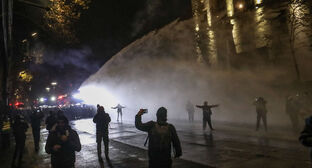19 October 2005, 10:14
Russophobe sentiments in N Caucasus
The Moscow Bureau of Human Rights (MBHR) held a presentation of the report "On Russophobia, Overt and Would-be" at the Independent Press Centre in Moscow. A substantial part of the report deals with Russophobe sentiments in North Caucasus republics.
The report summarises information about ethnic discrimination against Russians, activities of radical anti-Russian organisations, relevant articles in the media, facts of desecration of Orthodox churches, etc. This information was obtained in the course of nationwide monitoring.
"The most noticeable manifestation of anti-Russian nationalism is discrimination in appointments in national republics in Russia. Practically everywhere in these regions, senior government officials are all representatives of the aboriginal population... In Adygeia, non-aboriginal population amounts to nearly 80%, but representatives of the aboriginal population occupy practically all government offices," the report says.
The North Caucasus, primarily Chechnya, is a region with the most developed Russophobe sentiments. The Russian population was massively driven out from Chechnya in 1991-93, which was characterised by acts of violence. To a great extent, a part in this was played by weakness of the Chechen government at that time, as well as the general vulnerability of the Russian population. An outflow of the Russian population from other republics was also under way, but it was chiefly caused by economic reasons and fear of possible instability, according to the report.
The first and second wars in Chechnya (1994-96 and since 1999) were characterised by sweeping violations on the part of the military and police. This led to an outbreak of Russophobe sentiments among the Chechens. The situation became even worse when radical Islamism commonly known as "Wahhabism" penetrated Chechnya, the researchers say.
The scope of nationalism among minorities and the possibility to influence on the situation in the regions are considerably exaggerated by the "patriotic" press, in the opinion of the authors of the report, as it makes its supporters have a "fortress under siege syndrome." However, it can really begin to grow as a reaction to growth of Russian nationalism provoked to a great extent by both actually existing problems and irresponsible articles in the media. Besides, local nationalism can be used by regional elites if the central government grows weaker.
Author: Vyacheslav Feraposhkin, CK correspondent




